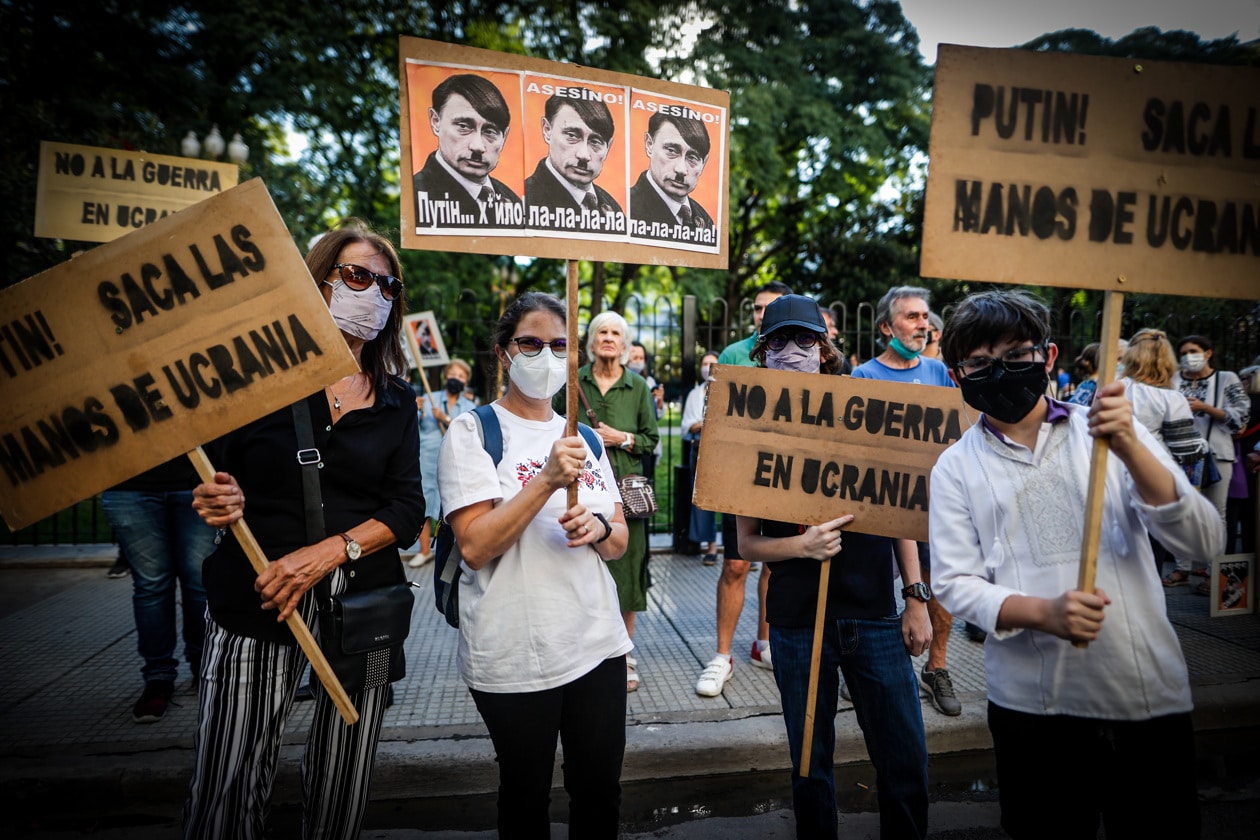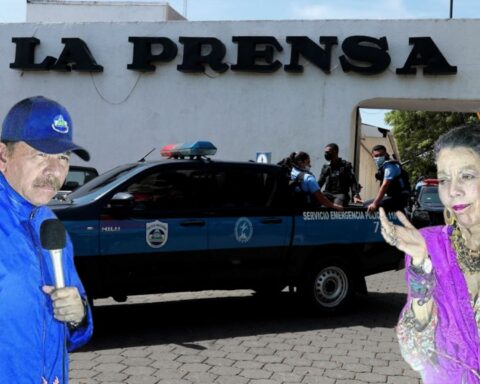Nicaragua reaffirmed its alignment with Russia’s political position by refusing to sign the declaration condemning the invasion of Ukraine, promoted in the Permanent Council of the Organization of American States (OAS) during a special session this Friday.
On Washington, the director of the National Security Council for the Western Hemisphere, Juan González, warned that the sanctions that The United States imposed this Friday against Russia will impact the Latin American governments that have strong ties with the government of Vladimir Putin, as is the case of Venezuela, Nicaragua and Cuba.
In an interview with the voice of americaGonzález, who is a special assistant to the president of the United States, Joe Biden, said that the sanctions against Russia should be considered so robust that “they will have an impact on those countries that have economic affiliations with Russia, and that is by design.” .
“Venezuela is going to start to feel that pressure, Nicaragua is going to feel that pressurelike Cuba. But in the end, what we want are negotiated solutions to the crisis in Venezuela, with a restoration of the democratic order in Nicaragua, and we want the Cubans to be the ones who determine their future, and not a dictatorship,” González told the Voice of America.
European sanctions
In the case of the European Union (EU), the Member States focused its second package of sanctions on Russia in attacking its financial system and choking the financing of banks and public companies, leaving aside for now more severe commercial retaliation that could inflict significant damage also on the EU countries due to their economic ties with Moscow.
The EU chose to leave out of this package of sanctions far-reaching trade measures that, for example, the United States has adopted, since they would have a “huge impact” in the economy of its Member States, who would be forced to pay a “high price” by them. This is how community sources recognize it by stressing that the bloc has a commercial relationship with Russia that multiplies by ten that of Washington: “Their trade ratio is 8 billion and ours is 80 billion”.
These reasons explain why the EU sanctions do not for now include restrictions on the trade of luxury products, such as diamonds, gas import bans or the disconnection of Russian banks from the SWIFT messaging system, a fundamental pillar for the operation of the international financial system.
Removing Russian entities from this system, as happened with some Iranian entities as a result of European sanctions in 2012, would mean cutting their financial ties abroad by preventing them from receiving foreign currency or making transfers for their commercial transactions and would have a “devastating”according to an analysis by the Carnegie Europe center.
With this scenario, the EU preferred to focus on cutting financing channels and denying access to capital markets to the Kremlin, its public companies and Russian banks through a series of decisions in the financial field. The private banks Alfa Bank and Bank Otkritie and the public ones Sberbank, Vneshtorgbank (VTB), Gazprombank, Russian Agricultural Bank and Vnecheconombank (VEB) join the list of entities sanctioned by the block, the financing of public companies such as Kamaz is also stopped , Rostec or Almaz-Antey and the opening of new deposits of more than 100,000 euros to Russian citizens in European banks is prohibited.
OAS Resolution
The crisis over Russian military operations in Ukraine was addressed by the OAS Permanent Council, where 23 countries approved the declaration of condemnation and the call for Russia to cease the aggression and open a diplomatic dialogue to resolve the conflict.
One of the countries that promoted the declaration of condemnation was Guatemala. In addition to Nicaragua, the other Central American country that did not sign the document was El Salvador.
The Salvadoran political analyst Napoleón Campos said he was disconcerted by the attitude that President Nayib Bukele’s diplomacy has taken, who even through his social networks has directly lambasted the United States Government for its position in relation to the crisis in Ukraine.
Campos also referred to the position of Nicaragua, of which he said he was not surprised by it and that, from his point of view, it will aggravate the situation of international isolation in which the Ortega regime finds itself since the electoral farce of November 7. of 2021.
“The OAS resolution demonstrates that there is widespread concern and dismay in the hemisphere about what is happening in Ukraine. The vast majority of countries in the OAS are aligned in condemning this violation of Ukraine’s territorial integrity, sovereignty and self-determination,” Campos said.
The declaration established in the Permanent Council states in its fourth point the “condemnation of the Russian military operation in Ukraine, which is contrary to the principles of respect and territorial integrity, as well as the prohibition of the threat and use of force and to peaceful resolution, enshrined in international law and in the charter of the United Nations”.
The declaration was promoted by Guatemala, Antigua and Barbuda, Bahamas, Belize, Canada, Chile, Colombia, Costa Rica, Ecuador, United States, Grenada, Guyana, Mexico, Panama, Peru, Dominican Republic, Suriname, Trinidad and Tobago, Jamaica, Honduras and Venezuela.
Ortega has precisely used the arguments related to sovereignty and the defense of independence to promote absurd prison sentences for presidential candidates, opponents, human rights activists, businessmen, journalists, and peasant and student leaders.
The representative of Nicaragua did not participate in the debate on the declaration of condemnation. Countries that did not adhere to this instrument such as Brazil, Bolivia, Argentina did, focusing their interventions on the need to reach political agreements to put an end to military operations in Eastern Europe.
“Foolish support”, says analyst
“Daniel Ortega’s support for Russia’s position is senseless, but let us understand that here they are understanding each other between tyrants. Moreover, with the visits of both the Russian deputy prime minister ( Yuri Borisov) and the president of the Russian State Duma (Vyacheslav Volodin), Daniel Ortega, has reconfirmed his character as a pariah in the American hemisphere and at the international level,” added Campos.
Volodin is in Nicaragua at the height of the Russian invasion of Ukraine. He was received by Laureano Ortega Murillo, son of the dictator, and Gustavo Porras, president of the National Assembly.
He appeared in the parliamentary chamber this Thursday to give a speech in which he thanked Daniel Ortega for being one of the first leaders to support Russia in the unilateral recognition of the pro-Russian separatist territories of Donetsk and Lugansk (eastern Ukraine), including the support Russian military. After his speech, he was applauded by the Ortega deputies and their political collaborationist allies.
“We thank the president of Nicaragua, Daniel Ortega, who was one of the first to declare the importance of recognizing the independence of the popular regions of Donbás to guarantee the security of the people,” he said.
He stressed that “Nicaragua is one of Russia’s solid partners” and that both countries strengthen their relations based on mutual respect, trust and “guided by the principle of non-interference in the internal affairs of sovereign states.”
Distancing can be aggravated in Central America
The specialist in international issues and professor at the University of Costa Rica, Carlos Murillo Zamora, said that the main political impact that the Ukraine crisis may have in Central America depends on the diplomatic positions that Nicaragua takes in the future. This is because it is the country that has most openly supported Russia’s position, including the use of troops in Ukraine.
“If even (Vladimir) Putin continued his campaign beyond Ukraine, Ortega would surely support him. This shows Putin’s distancing from the rest of the Central American countries that in the future the discussions related to the Central American integration process, which is currently very weak,” said Murillo Zamora.
“From my point of view, this can even affect the process of electing the Secretary General of SICA (Central American Integration System) because the gap between Ortega and the other Central American leaders is widening with this crisis in Ukraine,” he added.
Russian foreign policy expert, Ivan Ulysses Kentros Klyszczinterviewed on the show Tonight – broadcast on Facebook and YouTube due to the censorship of the Ortega regime – opined that the military escalation in Ukraine will lead Latin American countries aligned with Moscow “to have to weigh the serious diplomatic and even economic consequences” of maintaining these political and ideological ties. .
“It will force Russia’s allied countries in Latin America to reflect on the goals they achieve through their collaboration with Russia. A major conflict between Ukraine, Russia and the West would make any collaboration with Russia too costly in terms of diplomacy, international relations, and in terms of economic ties. It’s hard to predict what kind of impact there would be, but it would certainly make collaboration with any of these countries very difficult,” Kentros said on the show.








